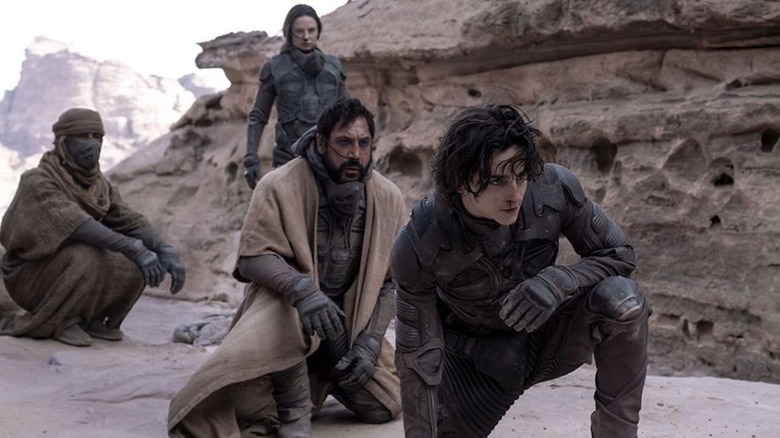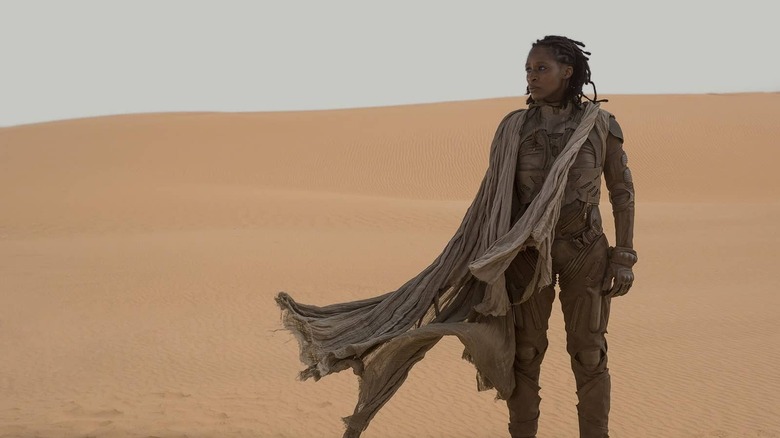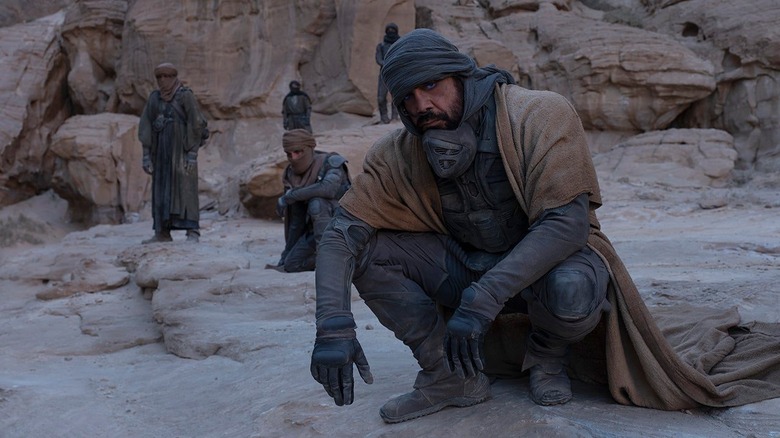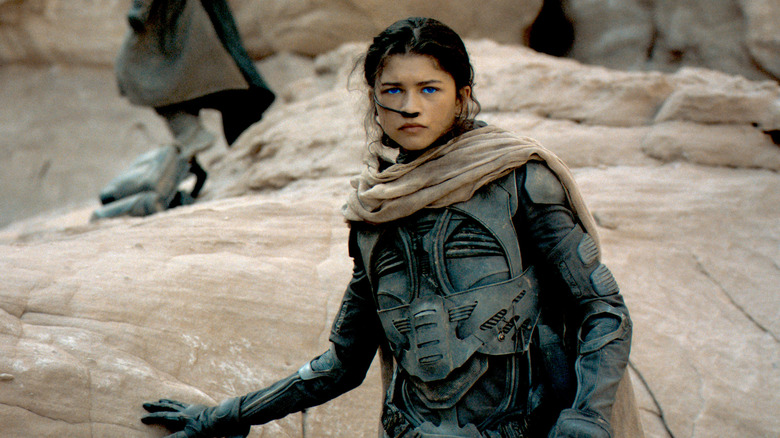The Oil Must Flow: How Does Denis Villeneuve's Dune Deal With The Book's Middle East Inspirations?
In Frank Herbert's "Dune," several imperial forces wage war over a precious resource that can only be found in a single location, while the natives of that land reap none of the benefits. In the seminal 1965 sci-fi novel, that resource is the hallucinogenic drug known as the "spice" melange, but it doesn't take much reading between the lines to see that "Dune" is about oil.
Like oil, melange is a highly valued resource without which an entire empire would collapse. Like the oil-rich Middle East, the desert planet of Arrakis is ruled over by a foreign force who reap all the benefits while treating the natives with a paternal wariness at best, hostility and persecution at worst. Herbert is not shy about his allegory either: Middle Eastern influences abound in "Dune," whether in the language, or the culture, or the messianic myth that drives his books.
But if you're coming to "Dune" strictly from its depiction on the big or small screen, these Middle Eastern ties may not be so obvious. David Lynch's 1984 feature adaptation of "Dune" was overwhelmingly white, as was Syfy's two miniseries iterations. Denis Villeneuve's upcoming adaptation of "Dune," therefore, must have a foot ahead of them, simply by virtue of having many people of color in its extremely attractive cast — Zendaya, Sharon Duncan-Brewster, and Jason Momoa among them. But several have already criticized the lack of MENA (AKA Middle East and North Africa) actors among the ensemble, despite the obvious influences of Islamic history on "Dune." But with the direction that the story is heading (should there be a Part II, or beyond), is a clear-cut Middle East allegory what we want? And how much does Villeneuve's "Dune" fall back on Middle Eastern imagery anyways?
The Oil Must Flow
In "Dune," melange, also known as "the spice," is a hallucinogenic drug that extends the life and enhances the capabilities of anyone who consumes it — allowing the all-powerful Empire to harness it to essentially fold space. By folding space, the Navigators of the Spacing Guild are able to travel between planets that are millions of light years away in an instant. Without this faster-than-light interstellar travel, the Empire would collapse.
It's obvious where the inspiration is here — a real-life fuel source without which entire countries and economies would collapse? Oil.
By the time Herbert published "Dune" in 1965, major oil explorations in Iraq had already been tearing through the country for more than 30 years. Refineries had been built, and major companies in the U.S., Britain, France, and Holland already had a chokehold on the oil distribution trade. Until 1958, when a coup overthrew the Iraqi monarch whose dealings with other countries kept the oil profits out of the hands of native Iraqis. This led to a domino effect that included the establishment of the Iraqi Petroleum Company, President Eisenhower's Iraq intervention, the creation of OPEC, and the 1979 Energy Crisis, but I'm not going to drag you into a whole history lesson. The point is that Herbert had a real-life source upon which to base his sci-fi story, and would draw heavily from the oil crisis in Iraq and the revolution that followed.
The Middle Eastern Influences on Dune
Just look at the abundance of Arabic words that Herbert appropriated in his books: Muad'dib. Jihad. In Arabic, Muad'dib — which is the name for the desert mouse that Paul Atreides takes as his messianic title — means "educator/he who teaches." And jihad is familiar for to anyone up to date with current events.
In an unpublished 1978 interview with Tim O'Reilly, Herbert cites the "colloquial Arabic" as a signal to the reader that they are "not here and now, but that something of here and now has been carried to that faraway place and time." Whether that only served to exoticize the characters of the book or whether it made "Dune" one of the rare foundational sci-fi books to not be entrenched in Western language and mythology is still a source of discussion, but there's no denying Herbert's admiration of Arabic and Islamic culture in his books.
Herbert doesn't strictly pull from Arabic language in "Dune" — "Kwisatz Haderach," the name of the prophesied messiah and superbeing, is a Hebrew term, for example. For the Padishah Emperor, Padishah is the Persian title for king. And he gets a little less subtle with his naming conventions with the native "Fremen" (literally a few letters off from "free man"), in addition to how eerily similar "Arrakis" sounds like Iraq.
A Crusade for Denis Villeneuve's Dune
Ahead of the release of "Dune," it was revealed that Denis Villeneuve would not be using the word "jihad" to describe the revolution led by Paul Atreides. Instead, it would be referred to as a "crusade," a word with Christian roots that itself feels in direct opposition to Herbert's Arab-inspired sci-fi saga. But this indicated that Villeneuve would be steering away from the Arab influences in "Dune" — which for some modern readers and audiences, might prove troubling.
I personally felt slightly troubled by the rampant racial coding in the book, feeling that Herbert (probably unintentionally) diminished the Fremen characters, who were treated in an almost patronizing manner — similar to how imperial forces treat natives in reality. And I wondered whether Villeneuve, in steering away from the Arab influences of the book and casting a variety of POC actors in the roles of both Fremen and imperial forces, might avoid the comparisons altogether. Would Villeneuve's vision completely divorce itself of the real-life inspirations by essentially going with a color-blind cast?
Not really. In fact, far from it. Villeneuve's adaptation of "Dune" is rife with Arab-inspired imagery, from the Moorish architecture, to the Middle Eastern-inspired outfits of the Arrakis natives, to the predominant casting of people of color as the Arrakis natives who greet the House Atreides when they arrive. Most obviously, there's Hans Zimmer's score, which features the haunting ululation of a woman that is unquestionably inspired by Middle Eastern music. You can practically see the tambourines.
And though Oscar Isaac, Jason Momoa, Dave Bautista, and Chang Chen hail from the imperial Houses Atreides or Harkonnen, it's apparent that most of the actors of color like Zendaya, Sharon Duncan-Brewster, and Babs Olusanmokun, are playing Fremen. And with the abundance of robes and head scarves they wear, it becomes even more apparent that there isn't a MENA actor in sight.
White Saviors of Arrakis
Through it all, Paul Atreides remains a white savior. It's the trope that refers to a white person from one culture coming into another to "save" the helpless, often uncivilized, minorities — a trope that has imperialist roots too. And it's an image that has become roundly savaged in recent media depictions, from "Game of Thrones" to "The Help." And it's one that Herbert's "Dune" intentionally subverts, though that will come much later.
Paul Atreides, and his revolution, is based in no small part by the man who inspired "Lawrence of Arabia," real-life British soldier T. E. Lawrence, who led a revolt against the Ottoman Empire during the First World War. But where "Dune" and reality differs is in the messianic "Chosen One" story. Paul is speculated to be the prophesied Kwisatz Haderach, a superbeing who will lead humanity into a new age at the bloody cost of thousands of lives. Throughout Villeneuve's "Dune," Chalamet's Paul struggles with and even rejects this prophecy, which his mother Lady Jessica (Rebecca Ferguson) believes he'll fulfill. But Herbert's later books will unravel the idea behind this prophesied messiah, becoming a warning of sorts against the white savior myth. And Villeneuve, if he ever gets around to adapting the rest of "Dune," certainly has a knack for debunking the Chosen One narrative.
All the same, is another white savior saga something we want to see play out on our big screen? Villeneuve's "Dune" just barely manages to bypass it by virtue of the POC actors throughout the ensemble, but if the Fremen were to be played exclusively by MENA actors, wouldn't this just create another problem for "Dune"? Perhaps this question is too big to be answered with a movie that is only "Part 1" of a story. Perhaps this was criticism that was always going to be levied at anyone who was going to adapt as racially loaded a book as "Dune."
"Dune" opens in theaters and on HBO Max on October 21, 2021.




